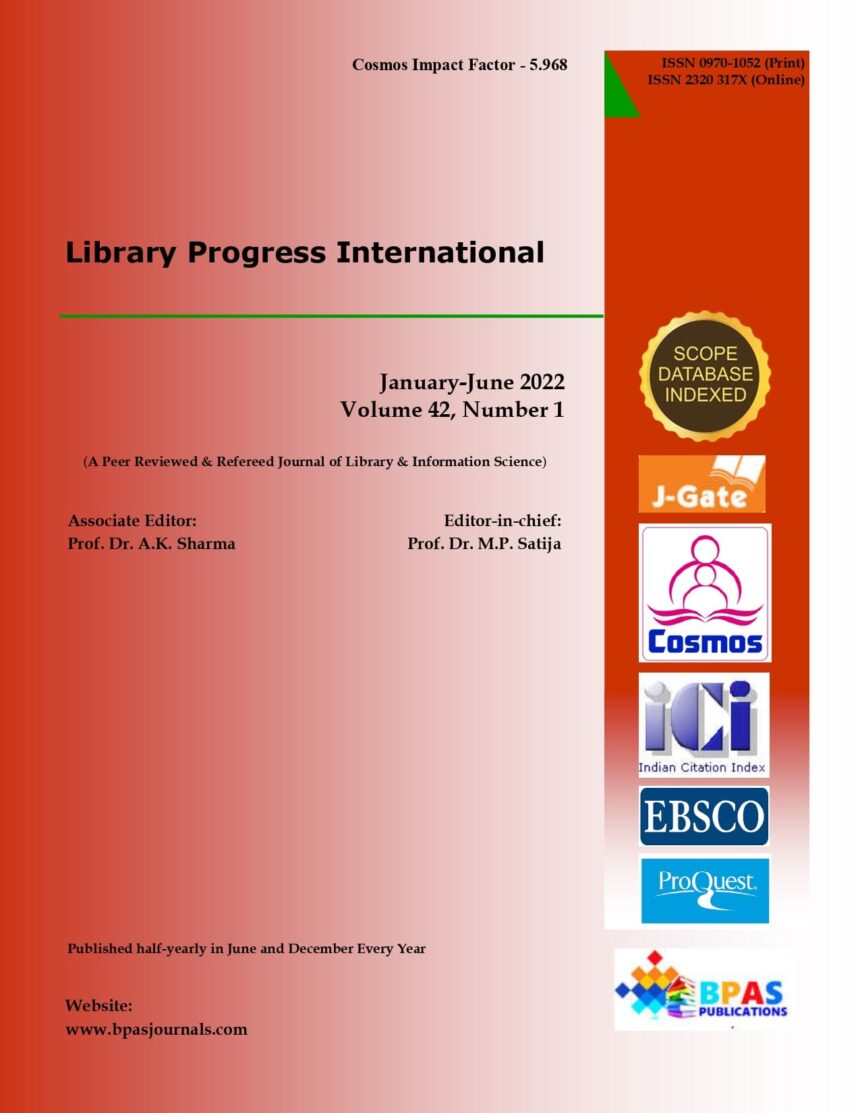A Survey on the use of Reference Services and Sources by Undergraduate Students in Federal University of Petroleum Resources, Effurun (FUPRE)
DOI:
https://doi.org/10.48165/Keywords:
Reference Services, Sources, Use, Undergraduate Students, FUPREAbstract
The survey assessed the use of reference services and sources by undergraduate students in Federal University of Petroleum Resources, Effurun (FUPRE). The total population of this study was 627 registered undergraduates’ students in the 2020/2021 academic session. The total enumeration sampling technique was used for the study, which implies studying the entire population. The instrument used for data collection was a structured questionnaire which was distributed to the respondents face to face with the aid of two research assistant. 627 copies of the questionnaire were distributed to the respondents and the researchers were able to retrieve only 497 which were dully filled and received and found usable for the study. There was a 79% return rate. The data collected for this study was analyzed using simple percentage and frequency counts. The findings revealed that the respondents are majorly aware of the assistance they receive from the reference librarian than other forms of reference services. As per regards reference sources the respondents indicated they are strongly aware of dictionaries, encyclopedia, handbooks/ manuals, yearbooks, and atlases. The respondents indicated they were unaware of directories, online reference tools and Almanacs. On the frequency of the use of reference services, the respondents indicated they use instruction on the use of library, assistance in identifying library materials, orientation services, and user education weekly, while current awareness services was used bi-monthly, referral services was used monthly and selective dissemination of information was used occasionally. On the frequency of the use of reference sources, the respondents indicated they use dictionaries on a daily basis, handbooks and encyclopedias weekly. The findings revealed that the respondents were very satisfied with the instructions they receive on the use of library, assistance in identifying library materials needed to answer a question, user education, library orientation, among others. As regards satisfaction with reference sources, the findings revealed that the respondents are very satisfied with dictionaries, encyclopedias, yearbooks and handbooks/manuals. The respondents also indicated they were satisfied with Atlases while a little fraction of the respondents indicated they were dissatisfied with directories, online reference tools, Almanacs and Gazetteers. It was recommended from the study that librarians should do more in the marketing of the Ask A Librarian Service to increase usage of the service by users, librarians should do more marketing to promote the use of directories, online reference tools and Almanacs in their university library and reference services and sources should be rendered in a separate section to make it easy for users to know where to go whenever they have an information need.
Downloads
References
Abdullahi, Z.M., & Mamza, W.P. (2014). Effectiveness of reference services in providing students’ information needs in tertiary institutions in Nigeria. Information Impact: Journal of Information and Knowledge Management, 5(2). https://www.ajol.info/index.php/iijikm/
article/view/144632
David-West, B.T. (2019). Availability and utilisation of reference sources in academic libraries. . Library Philosophy and Practice (e-journal). Paper 3653. Retrieved from
https://digitalcommons.unl.edu/libphilp rac/3653
Dulle, F., Minish-Majanja, M., & Cloete, L. (2010).Factors influencing the adoption of open access scholarly communication in Tanzanian public universities. Retrieved from
http://www.ifla.org/files/hq/papers/ifl a76/138-dulle-en.pdf
Egbukole, K.N. (2017). Awareness and perception of reference sources and services by undergraduate students of the Federal University OF Technology, Owerri, Nigeria. Information Technologist (The), 14(2). Retrieved from https://www.ajol.info/index.php/ict/arti cle/view/164809
Hussien, F.R.M., & Mokhtar, W.N.H.W. (2018).The effectiveness of reference services and users’ satisfaction in the academic library. International Journal of Academic Research in Progressive Education and Development, 7(3), 327–337.
Iroaganachi, M.A., & Ilogho, J.E. (2012).Utilization of reference books by students: A case study of covenant university, Nigeria. Retrieved from http://eprints.covenantuniversity.edu.ng
/3289/#.YJQfXS1KjIU
Iwhiwhu, B.E., & Okorodudu, P.O. (2012). Public library information resources, facilities, and services: User satisfaction with the Edo State Central Library, Benin City, Nigeria. Library Philosophy and Practice. Retrieved from
http://www.webpages.uidaho.edu/`mbo lin/iwhiwhu-okorodudu.htm
Kumari, H.A., & Talawar, V.G. (2009). Use of reference sources in university libraries of Karnataka: a study. Retrieved from http://nopr.niscair.res.in/handle/123456
/5940
Madukoma, E. (2015). Users’ perception of electronic reference services in Babcock University Library, Ilishan-Remo, Ogun State, Nigeria. Retrieved from https://www.ifla.org/files/assets/refere
nce-and-information
services/publications/2015_ifla_reference _section-madukoma-en2.pdf
Ogunniyi, S.O., Efosa, F.E., & Sheji, M.R. (2013). Use of Reference Sources and Services by Students in Adeyemi College of Education Library, Ondo, Ondo State, Nigeria. Greener Journal of Library, Information and Archival Sciences, 1(1), 001-
Okeke, I.E., Oghenetga, L.U., & Nwabu, E.C. (2013). Students’ attitude towards the use of reference and information services (RIS) in academic Libraries in Nigeria.
International Journal of Library and Information Science, 5(10), 335-341.
Okorafor K, ArioIe IA, Anyalebechi LI. (2017). Awareness and use of reference and information services amongst library users in university libraries in two States in Nigeria. Journal of Applied Information Science and Technology; 10(3), 109-116.
Onifade, F.N., and Sowole, A.O. (2011). Reference Services in a University Library: Awareness and Perception of Undergraduate Students. PNLA Quarterly, the official publication of the Pacific Northwest Library, 75(3), 1-8.
Oyewole, O., & Alegbeleye, G.B. (2018) Undergraduates’ preference between web search engines and reference sources for research activities in two universities in South West Nigeria. Library Philosophy and Practice. Retrieved from https://digitalcommons.unl.edu/libphilp
rac/1937/
Rehman, S.U., Shafique, F., Mahmood, K. (2011). A Survey of user perception and satisfaction with reference services in university libraries of Punjab. Library Philosophy and Practice (e-journal). Paper 624. Retrieved from http://digitalcommons.unl.edu/libphilpr ac/624
Singh, K., & Kuri, R. (2017).User’s satisfaction with library resources and services: a case study of IIT Libraries in India. Retrieved from http://eprints.rclis.org/32196/1/USER%
E2%80%99S%20SATISFACTION%20WIT H%20LIBRARY%20RESOURCES%20AND %20SERVICES%20A%20CASE%20STUDY %20OF%20IIT%20LIBRARIES%20IN%20I NDIA.pdf
Tiemo, P.A., & Ateboh, B.A. (2016). Users` satisfaction with library information resources and services: a case study college of health sciences library Niger Delta University, Amassoma, Nigeria. Journal of Education and Practice, 7(16), 54- 59.
York University Libraries. (2021). Reference materials. Retrieved from https://www.library.yorku.ca/web/resea rch-learn/reference-materials/

